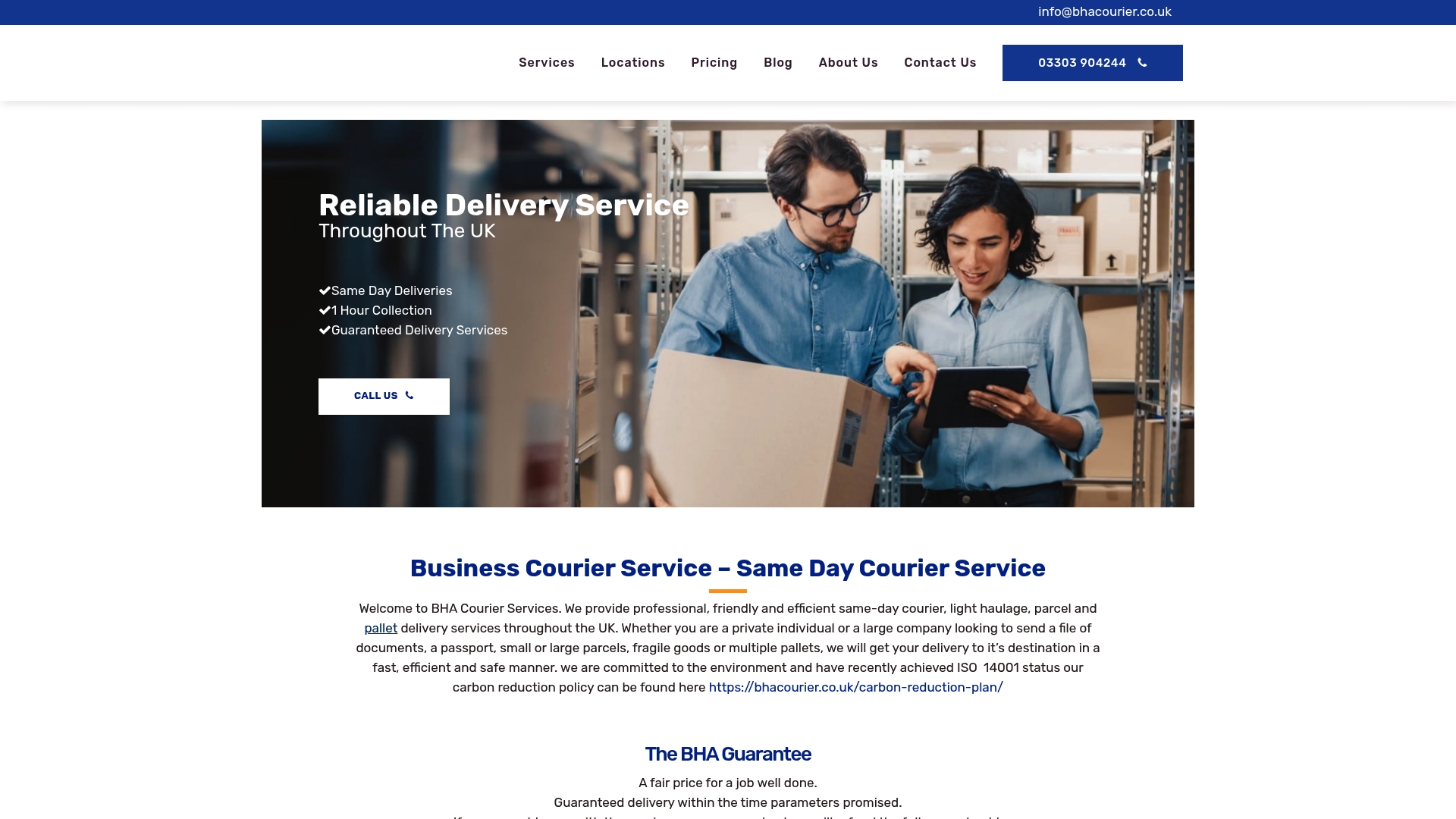
05 Jul Perishable Goods Delivery in 2025: Reliable Services for UK Businesses

Perishable goods delivery in the UK is reshaping how everything from fresh vegetables to vital medicines reach businesses and homes. Here’s the surprise: there has been a 106 percent increase in van movements across the country over the past decade. Most would assume more vans mean smoother deliveries, yet the reality is different. The real challenge is not more vehicles but keeping every product perfectly chilled, tracked and compliant for miles on end.
Table of Contents
- Understanding Perishable Goods Delivery In The UK
- Key Challenges And Solutions For Businesses
- Best Practices For Engineering Companies
- Choosing A Trusted Delivery Partner In 2025
Quick Summary
| Takeaway | Explanation |
|---|---|
| Temperature Control is Critical | Maintaining precise temperature ranges during transportation is essential to prevent spoilage and ensure product quality in perishable goods delivery. |
| Leverage Technological Innovations | Advanced tracking systems, predictive maintenance, and intelligent route optimization are vital for enhancing logistics efficiency and reliability in the perishable goods sector. |
| Regulatory Compliance is Necessary | Adhering to stringent safety and quality standards is mandatory, requiring businesses to invest in training, equipment, and robust quality assurance mechanisms. |
| Assess Delivery Partners Thoroughly | When selecting delivery partners, businesses should evaluate their technological capabilities, compliance credentials, and operational infrastructure to ensure they can meet the demands of transporting temperature-sensitive goods. |
| Focus on Workforce Development | Addressing the significant workforce challenges, such as HGV driver shortages, is crucial. Companies must invest in training and improving working conditions to maintain effective delivery networks. |

Understanding Perishable Goods Delivery in the UK
Perishable goods delivery represents a complex and critical logistical challenge for UK businesses, requiring precision, speed, and specialized infrastructure. The transportation of temperature-sensitive products like fresh produce, pharmaceuticals, and biological materials demands sophisticated technological solutions and robust cold chain management.
The Complex Ecosystem of Temperature-Controlled Logistics
The UK’s perishable goods delivery sector operates within an intricate ecosystem that balances technological innovation, regulatory compliance, and stringent safety protocols. According to research from the UK government’s food security report, the Just-in-Time (JIT) inventory model has significantly transformed how businesses approach perishable goods transportation. This model minimizes stockpiles to reduce costs but simultaneously increases vulnerability to potential transport disruptions.
Modern perishable goods delivery services must navigate multiple challenges, including maintaining precise temperature ranges, managing rapid spoilage risks, and ensuring consistent product quality. Temperature control emerges as the most critical factor, with even minimal deviations potentially rendering entire shipments unsuitable for consumption or use.
Technological Advancements in Cold Chain Management
Recent technological developments have revolutionized perishable goods delivery. Data from public health research reveals that online grocery delivery services have dramatically transformed consumer purchasing behaviors, with households increasing their weekly energy intake through more frequent online food purchases. This shift necessitates more sophisticated delivery infrastructures.
Advanced tracking systems now incorporate real-time temperature monitoring, GPS tracking, and predictive analytics. These technologies enable logistics providers to:
- Monitor Environmental Conditions: Continuous tracking of temperature, humidity, and potential external shocks during transportation.
- Predictive Maintenance: Anticipate potential equipment failures before they compromise product integrity.
- Route Optimization: Select the most efficient transportation paths that minimize transit times and potential temperature fluctuations.

Regulatory Landscape and Compliance Requirements
The UK’s perishable goods delivery sector operates under stringent regulatory frameworks designed to protect consumer safety and maintain product quality. Companies must adhere to multiple standards, including food safety regulations, pharmaceutical transportation guidelines, and industry-specific temperature control protocols.
Businesses must invest in comprehensive training programs, sophisticated equipment, and robust quality assurance mechanisms. Learn more about our dedicated delivery solutions that meet these rigorous standards and ensure your perishable goods reach their destination in optimal condition.
As consumer expectations continue to evolve and technological capabilities expand, the perishable goods delivery sector will undoubtedly witness further innovations. The ability to adapt, innovate, and maintain unwavering commitment to product integrity will distinguish successful logistics providers in this dynamic and critical industry.
Key Challenges and Solutions for Businesses
The perishable goods delivery sector presents a complex landscape of challenges that demand innovative solutions from UK businesses. Navigating these challenges requires strategic planning, technological adaptation, and robust logistics management.
Supply Chain Vulnerabilities and Disruption Management
Businesses face unprecedented challenges in maintaining reliable perishable goods delivery networks. Research from the UK government’s logistics report highlights the critical vulnerabilities in the Just-in-Time (JIT) inventory model. The surge in online shopping has dramatically transformed delivery dynamics, with local government data revealing a 106% increase in van movements over the past decade.
Transportation challenges have become increasingly complex. Businesses must now contend with:
- Rapidly changing delivery expectations
- Increasing urban congestion
- More stringent temperature control requirements
- Heightened consumer demand for precision and speed
Workforce and Logistical Infrastructure Challenges
The UK logistics sector faces significant workforce challenges that directly impact perishable goods delivery. According to industry reports, the country experiences a shortage of over 100,000 HGV drivers, a situation exacerbated by Brexit and the COVID-19 pandemic. This shortage creates substantial challenges for businesses relying on timely and efficient perishable goods transportation.
To address these challenges, forward-thinking companies are implementing comprehensive strategies:
- Investing in advanced training programs
- Developing robust recruitment pipelines
- Implementing technological solutions to optimize existing workforce capabilities
- Creating more attractive working conditions for logistics professionals
Technological Solutions and Strategic Adaptations
Technology emerges as a critical solution to many delivery challenges. Advanced tracking systems, real-time monitoring, and predictive analytics are transforming how businesses approach perishable goods delivery. Learn more about our dedicated delivery solutions that leverage cutting-edge technologies to overcome traditional logistical barriers.
Businesses must focus on several key technological adaptations:
- Integrated Tracking Systems: Implementing real-time monitoring of temperature, location, and delivery conditions
- Predictive Maintenance: Using AI and machine learning to anticipate potential disruptions
- Route Optimization: Developing intelligent routing algorithms that minimize transit times and reduce potential product degradation
The future of perishable goods delivery demands a holistic approach. Successful businesses will be those that combine technological innovation, workforce development, and strategic planning. By addressing challenges proactively and investing in advanced solutions, companies can transform potential obstacles into competitive advantages in the rapidly evolving logistics landscape.
To help illustrate the main challenges and solutions facing UK businesses in perishable goods delivery, the table below organises the critical issues and proactive responses mentioned in this section.
| Challenge | Description | Key Solution |
|---|---|---|
| Supply Chain Vulnerabilities | Increased risk due to Just-in-Time models and rising van movements | Strategic planning and robust logistics management |
| Workforce Shortages | Shortfall of over 100,000 HGV drivers, exacerbated by Brexit & COVID-19 | Advanced training, recruitment, and improved working conditions |
| Urban Congestion | Greater delivery delays and lost time in cities | Route optimisation with intelligent algorithms |
| Stricter Temperature Control | Heightened consumer demand and regulatory requirements | Real-time monitoring, predictive maintenance |
| Rapidly Changing Delivery Expectations | E-commerce growth driving need for speed and accuracy | Investment in advanced tracking, flexible logistics |
Best Practices for Engineering Companies
Engineering companies play a pivotal role in developing and implementing advanced solutions for perishable goods delivery. Their expertise in design, technology, and systems integration is crucial for creating robust and efficient logistics infrastructure.
Regulatory Compliance and Safety Standards
Engineering companies must prioritize strict adherence to regulatory frameworks governing perishable goods transportation. The UK government’s guidance on transporting perishable foodstuffs mandates compliance with the Agreement on the International Carriage of Perishable Foodstuffs (ATP). This requires obtaining specific vehicle approvals and implementing rigorous temperature control mechanisms.
According to the Health and Safety Executive, engineering firms must conduct comprehensive risk assessments for delivery and collection processes. Key considerations include:
- Vehicle safety design
- Accident prevention strategies
- Ergonomic considerations for loading and unloading
- Comprehensive driver training programs
Advanced Technological Design and Optimization
Cutting-edge engineering approaches are transforming perishable goods delivery. A groundbreaking research study on stochastic programming demonstrates remarkable advancements in temperature control strategies, revealing potential improvements of up to 35% through sophisticated thermodynamic modeling.
Engineering companies should focus on developing:
- Intelligent Refrigeration Systems: Incorporating adaptive cooling technologies that respond dynamically to environmental conditions
- Sensor Integration: Implementing real-time monitoring capabilities for temperature, humidity, and potential mechanical stress
- Predictive Maintenance Algorithms: Creating systems that anticipate potential equipment failures before they compromise product integrity
Sustainable and Efficient Design Strategies
Sustainability has become a critical consideration in engineering perishable goods delivery solutions. Companies must balance technological efficiency with environmental responsibility. This involves:
- Developing energy-efficient refrigeration technologies
- Designing vehicles with reduced carbon footprints
- Creating modular systems that can be easily upgraded or retrofitted
Learn more about our dedicated delivery engineering solutions that represent the pinnacle of innovation in perishable goods transportation.
The future of perishable goods delivery demands a holistic engineering approach that combines technological innovation, regulatory compliance, and environmental consciousness. Engineering companies that can successfully integrate these elements will lead the way in transforming logistics infrastructure, ensuring the safe, efficient, and sustainable transportation of temperature-sensitive goods.
Choosing a Trusted Delivery Partner in 2025
Selecting a reliable delivery partner for perishable goods has become increasingly complex in the evolving logistics landscape. Businesses must navigate a sophisticated ecosystem of service providers to ensure product integrity, timely delivery, and regulatory compliance.
The following table summarises the most important criteria businesses should use to assess and compare potential perishable goods delivery partners, as discussed in this section.
| Criteria | What to Look For | Why It Matters |
|---|---|---|
| Technological Capabilities | Real-time temperature & GPS tracking, predictive maintenance | Ensures transparency, product safety, rapid issue response |
| Compliance Credentials | Verified certifications, adherence to regulations (GBSF, ATP) | Guarantees legal compliance & product quality |
| Fleet Infrastructure | Modern, well-maintained temperature-controlled vehicles | Maintains consistent cold chain and minimises spoilage |
| Response Flexibility | Ability to manage unexpected challenges | Reduces risk of supply chain disruption |
| Data Transparency | Detailed logging, accessible reporting tools | Builds trust and enables informed decision-making |
Critical Selection Criteria for Delivery Partners
The United Kingdom Food Security Report 2024 underscores the critical importance of resilient supply chains. When evaluating potential delivery partners, businesses should prioritize several key assessment factors:
- Technological Capabilities: Advanced tracking and temperature monitoring systems
- Compliance Credentials: Verified certifications and regulatory adherence
- Fleet Infrastructure: Modern, well-maintained temperature-controlled vehicles
- Response Flexibility: Demonstrated ability to manage unexpected logistical challenges
According to the Cold Chain Federation, specialized logistics providers are essential for maintaining the integrity of temperature-sensitive products. Companies must look beyond basic transportation services and evaluate partners with comprehensive cold chain expertise.
Evaluating Technical and Operational Competence
Modern delivery partnerships require deep technological integration. Businesses should conduct thorough assessments that go beyond traditional service level agreements. Key evaluation metrics include:
- Real-time tracking capabilities
- Predictive maintenance protocols
- Detailed temperature logging and reporting
- Rapid incident response mechanisms
Technological transparency has become a non-negotiable requirement. Delivery partners must provide comprehensive data insights that enable businesses to monitor and verify product conditions throughout the transportation process.
Regulatory Compliance and Quality Assurance
The Crown Commercial Service’s food procurement framework provides comprehensive guidelines for selecting high-quality delivery partners. Businesses should verify potential partners against multiple compliance dimensions:
- Government Buying Standards for Food and Catering (GBSF)
- Industry-specific temperature control regulations
- Environmental sustainability credentials
- Workplace safety and training standards
Learn more about our dedicated delivery solutions that set new benchmarks in perishable goods transportation.
The landscape of perishable goods delivery continues to evolve rapidly. Successful businesses will prioritize delivery partnerships that demonstrate not just operational excellence, but a forward-looking approach to technological innovation, regulatory compliance, and sustainable practices. By adopting a holistic evaluation framework, companies can secure delivery partners that transform logistical challenges into competitive advantages.
Frequently Asked Questions
What are perishable goods?
Perishable goods are products that have a limited shelf life and require specific temperature controls to prevent spoilage. This includes items like fresh produce, dairy products, meats, and pharmaceuticals.
Why is temperature control crucial in perishable goods delivery?
Temperature control is critical because even slight deviations can lead to spoilage or degradation of quality. Maintaining precise temperature ranges ensures the safety and integrity of temperature-sensitive products during transportation.
What technological advancements are improving cold chain management?
Technological advancements such as real-time temperature monitoring, GPS tracking, and predictive analytics are enhancing cold chain management. These innovations help logistics providers monitor environmental conditions, predict equipment failures, and optimise delivery routes.
How can businesses choose a reliable delivery partner for perishable goods?
Businesses should evaluate delivery partners based on their technological capabilities, compliance credentials, fleet infrastructure, response flexibility, and data transparency. A trusted partner will have the necessary equipment and expertise to ensure safe and timely delivery of perishable goods.
Take Perishable Goods Delivery Challenges Off Your Plate—Choose Proven, Temperature-Safe Solutions
Struggling to keep your perishable deliveries on track as regulations tighten and expectations rise? Frustrated with last-minute delays or worried about maintaining precise temperature control across complex UK routes? The article highlights that every degree and every minute count when it comes to quality and compliance. When your business needs absolute certainty, you cannot afford to take chances with sensitive supply chains or risk customer trust.

Why wait for problems to disrupt your supply chain? Act now to secure rapid, reliable transport. With BHA Courier’s same day delivery and next day delivery guaranteed, you get cutting-edge tracking, strict temperature monitoring, and UK-wide coverage—all backed by a specialist team who knows what is at stake. Protect your reputation and your products by making your next shipment count. Book your solution today on our main site and discover how easy stress-free logistics can be.
Recommended
- Business Courier Service – Same Day Courier Service – BHA Couriers
- Emergency Courier Service for Keys – BHA Couriers
- Light Haulage Services – UK-Wide Delivery – BHA Couriers
- BHA Couriers West Midlands | Dedicated Delivery
- BHA Couriers South West | Dedicated Delivery
- BHA Couriers East Midlands | Dedicated Delivery


